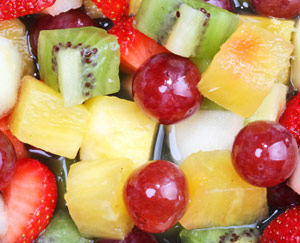health guides
Feed Your Good Mood with Fruits and Vegetables

Tracking food and mood
The study included 281 healthy college students who agreed to fill out daily online questionnaires about their food choices and their moods for 21 days. Using the questionnaires, they recorded their consumption of fresh fruits, fresh vegetables, pastries, and chips or crisps each day. They also recorded their experience of negative moods such as sadness, depression, anxiousness, tension, and anger, and positive moods such as happiness, cheerfulness, calmness, contentedness, and excitement.
Healthy diet leads to happiness
The study showed some interesting relationships between foods and moods:
- The students had more positive moods on days that they ate more fruits and vegetables.
- Positive mood was also linked to the previous day’s fruit and vegetable intake, but the previous day’s mood did not affect fruit and vegetable intake. This suggests that the relationship was due to fruits and vegetables causing a positive mood, rather than a good mood causing healthier food choices.
- The students had more negative moods on days that they ate more French fried potatoes and potato chips and fewer fruits and vegetables.
The researchers calculated that, in order for fruits and vegetables to contribute to a good mood, the students needed to eat about 7 to 8 servings of fruits and vegetables a day. “We found strong relationships between daily positive affect [mood] and fruit and vegetable consumption,” they said. “The current findings suggest that many apples a day is part of a balanced approach to keep the blues away.”
Eating for happiness
Making sure you get plenty of fresh fruits and vegetables every day can stave off a number of chronic health problems, and now it seems it might even make you happier. Here are some other food tips to brighten your mood:
- Have some fish. People who get higher amounts of omega-3 fatty acids from eating fish or taking fish oil have a lower risk of depression.
- Limit sweets. Sugar and refined carbohydrates (mainly white flour products) cause fluctuations in blood sugar levels than can trigger fluctuations in mood. Studies have found that cutting out sugar can help people who have depression.
- Identify food sensitivities. Eliminating commonly reactive foods like wheat and dairy can lead to increased energy and brighter mood for some people.
(Br J Health Psychol 2013;18:782–98)
Copyright © 2024 TraceGains, Inc. All rights reserved.


 We are proud to announce that
We are proud to announce that  As the market evolves, customers increasingly request a wider variety of omega-3 options for their lipid...
As the market evolves, customers increasingly request a wider variety of omega-3 options for their lipid...  Maintaining healthy glucose levels is crucial for preventing metabolic conditions like diabetes,...
Maintaining healthy glucose levels is crucial for preventing metabolic conditions like diabetes,...  Looking at formulating a new vitamin blend? Discover
Looking at formulating a new vitamin blend? Discover 







































